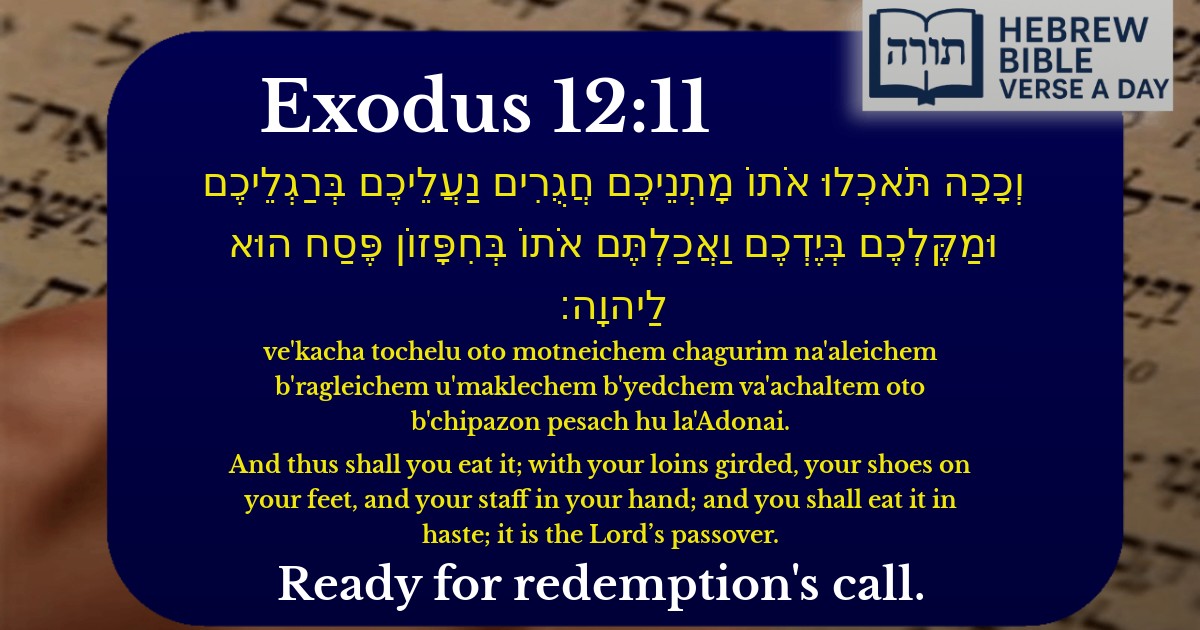Join Our Newsletter To Be Informed When New Videos Are Posted
Join the thousands of fellow Studends who rely on our videos to learn how to read the bible in Hebrew for free!
Hebrew Text
וְכָכָה תֹּאכְלוּ אֹתוֹ מָתְנֵיכֶם חֲגֻרִים נַעֲלֵיכֶם בְּרַגְלֵיכֶם וּמַקֶּלְכֶם בְּיֶדְכֶם וַאֲכַלְתֶּם אֹתוֹ בְּחִפָּזוֹן פֶּסַח הוּא לַיהוָה׃
English Translation
And thus shall you eat it; with your loins girded, your shoes on your feet, and your staff in your hand; and you shall eat it in haste; it is the Lord’s passover.
Transliteration
Ve'kacha tochelu oto motneichem chagurim na'aleichem b'ragleichem u'maklechem b'yedchem va'achaltem oto b'chipazon pesach hu la'Adonai.
Hebrew Leining Text
וְכָ֘כָה֮ תֹּאכְל֣וּ אֹתוֹ֒ מׇתְנֵיכֶ֣ם חֲגֻרִ֔ים נַֽעֲלֵיכֶם֙ בְּרַגְלֵיכֶ֔ם וּמַקֶּלְכֶ֖ם בְּיֶדְכֶ֑ם וַאֲכַלְתֶּ֤ם אֹתוֹ֙ בְּחִפָּז֔וֹן פֶּ֥סַח ה֖וּא לַיהֹוָֽה׃
וְכָ֘כָה֮ תֹּאכְל֣וּ אֹתוֹ֒ מׇתְנֵיכֶ֣ם חֲגֻרִ֔ים נַֽעֲלֵיכֶם֙ בְּרַגְלֵיכֶ֔ם וּמַקֶּלְכֶ֖ם בְּיֶדְכֶ֑ם וַאֲכַלְתֶּ֤ם אֹתוֹ֙ בְּחִפָּז֔וֹן פֶּ֥סַח ה֖וּא לַיהֹוָֽה׃
🎵 Listen to leining
Parasha Commentary
📚 Talmud Citations
This verse is quoted in the Talmud.
📖 Pesachim 96a
The verse is discussed in the context of the laws of eating the Passover offering, particularly the requirement to eat it in haste and with readiness to depart, as the Israelites did when leaving Egypt.


The Command to Eat the Passover in Haste
The verse (Shemot 12:11) describes the manner in which Bnei Yisrael were to eat the Korban Pesach (Paschal lamb) on the night of the Exodus. Rashi explains that the phrase "מָתְנֵיכֶם חֲגֻרִים" ("your loins girded") signifies readiness for a journey, as travelers would tie their garments tightly for ease of movement. The "נַעֲלֵיכֶם בְּרַגְלֵיכֶם" ("your shoes on your feet") and "מַקֶּלְכֶם בְּיֶדְכֶם" ("your staff in your hand") further emphasize their imminent departure from Egypt, as they were to eat in a state of preparedness for redemption.
The Symbolism of Eating in Haste
The instruction to eat "בְּחִפָּזוֹן" ("in haste") reflects the urgency of the moment. The Ramban (Nachmanides) notes that this haste was not due to fear of the Egyptians, but rather a demonstration of their faith in Hashem's promise to redeem them swiftly. The Sforno adds that eating in this manner reinforced their trust that the redemption was imminent and irreversible.
The Significance of "Pesach LaHashem"
The concluding phrase "פֶּסַח הוּא לַיהוָה" ("it is the Lord’s passover") underscores the divine nature of the Korban Pesach. The Mechilta explains that the term "Pesach" refers to Hashem "passing over" the houses of Bnei Yisrael during the plague of the firstborn. The Korban Pesach thus serves as a remembrance of Hashem's mercy and the covenant between Him and His people.
Halachic Implications